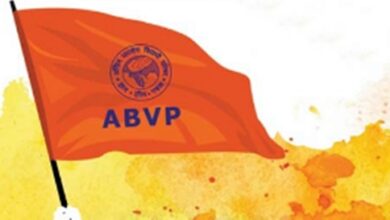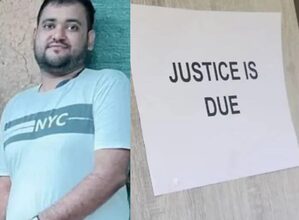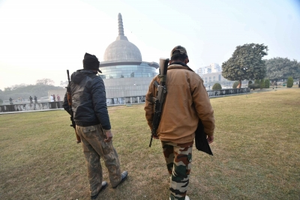Did Pranab bid to become PM after Indira Gandhi’s death? Here’s his side of the story
New Delhi, Dec 7 (IANS) “Did she deserve all these bullets?” These were the first words that disconsolate Rajiv Gandhi uttered when he learnt from BBC Radio that 16 bullets had been pumped into his mother, Indira Gandhi, by her assassins.
He was returning from Kanthi (Contai) in the Purba Medinipur district of West Bengal where he had to abandon an election meeting after listening to the terrible news on October 31, 1984. Accompanying him were Pranab Mukherjee and another senior Congress leader, A.B.A. Ghani Khan Choudhury, who was then the Union Minister for Railways.
Rajiv, however, did not have time to grieve, for he was soon in the thick of the moves being made for a smooth succession with him at the helm. And what transpired in those moments has been the subject of much speculation — and is rumoured to be the reason for Rajiv eventually consigning Mukherjee to the political doghouse.
The story that continues to be in circulation is that after Rajiv Gandhi confirmed the news of his mother’s assassination on their flight to Delhi from Kolkata, Pranab Mukherjee, by virtue of being the number two in Indira Gandhi’s cabinet, had staked his claim to be the country’s interim prime minister.
This act of Mukherjee was held against him as a sign of his purportedly dodgy loyalty to the First Family of the Congress.
It was then said that this act of his was the reason why he lost his cabinet berth (he was the Finance Minister) to V.P. Singh when Rajiv announced his new team on December 31, 1984. And he was kept out of the government till P.V. Narasimha Rao rehabilitated him as Deputy Chairman, Planning Commission, in 1991.
Mukherjee’s daughter and biographer, Sharmishtha, attempts to set the record straight in her just-published book ‘Pranab, My Father’ (Rupa). Quoting from her father’s private papers, Sharmishtha points out that far from staking his claim, Mukherjee spoke in favour of Rajiv becoming the PM.
She writes: “Since then, his relationship with the Gandhi family was seen through the prism of this speculation. Supposedly, that was the reason why the Gandhis never trusted him again.
“According to the media, in 2004 and again in 2009, when Sonia chose Dr Manmohan Singh over Pranab as PM in the UPA-I and UPA-II governments, the ‘trust deficit’ was brought in by what purportedly happened in the aircraft back in 1984.
“There was perhaps some trust deficit on Rajiv’s part, and later on with Sonia too, but it was definitely not due to Pranab’s alleged desire to become PM. It was factually incorrect and Rajiv (and presumably Sonia) knew it too.”
So what, according to Sharmishtha, really transpired on that flight from Kolkata to Delhi?
“Among his papers,” Sharmishtha writes, “I found some handwritten notes, dating back to 1985, in which Pranab gave a detailed account of the events that unfolded on the airplane and also shed light on why he was dropped from the Rajiv Gandhi government that was sworn in on 31 December 1984.”
Mukherjee wrote that after Rajiv announced that Indira was no more, Pranab broke down. It took him some time to regain his composure.
“Rajiv returned to the cockpit,” Sharmishtha writes. “There was pindrop silence in the plane. The silence was broken by Balram Jakhar [senior Punjab Congress leader and the then Lok Sabha Speaker] who inquired about the criteria used to choose Gulzarilal Nanda as interim PM on two previous instances.”
Jakhar asked whether it was because Nanda held the position of home minister. Mukherjee then pointed out that the criterion was not the portfolio that he held, but rather his position in the Union Cabinet as number two. Uma Shankar Dikshit, a confidant of Indira Gandhi, also agreed with Mukherjee.
“Then Jakhar, Dikshit and Ghani Khan went to the rear of the plane,” Sharmishtha continues. “Pranab kept sitting. Despite the burden of sorrow weighing on his heart and mind, he pondered over the next course of action … .
“He wrote in his notes, ‘I thought that Indiraji wanted Rajiv to be PM and it was my duty to ensure Rajiv is installed as PM.’ … Jakhar asked him to join the discussion and sought his opinion on Rajiv taking over immediately. Pranab readily endorsed this suggestion.”
Sharmishtha goes on to note that it was in fact Ghani Khan Choudhury who questioned the move. Her account may explain why the West Bengal heavyweight was removed from the Ministry of Railways and packed off to the Ministry of Programme Implementation by Rajiv Gandhi on December 31, 1984.
“Ghani Khan suggested returning to Delhi to discuss and make a decision. He questioned whether an ‘outsider’ (a person outside the Cabinet) could be made PM, as Rajiv was not a minister at that time. He further said, ‘If anybody from the existing ministry is to take over, then it should be you [Pranab] or PV [Narasimha Rao].’
“Pranab replied that if the Congress Parliamentary Party chose Rajiv as its leader, no one should have any objection. He told them, ‘I do not fear anything from the President’s side as he would have no option but to go with the decision of the party which has a majority in the Lok Sabha’.
“He further pointed out that on earlier occasions when Nanda was sworn in as interim PM, the situation was very different as both Pandit Nehru and Lal Bahadur Shastri had passed away due to natural causes.
“Here, a PM had been assassinated. A sudden and unexpected void had emerged, causing a sense of fear and uncertainty. To address that, it was best to make Rajiv the PM without any delay and without an interim PM.
“Balram then asked Pranab to talk to Rajiv. Pranab went to Rajiv and requested him to take over as PM. Rajiv then asked, ‘Do you think I can manage?’ Pranab replied, ‘Yes, you can. Besides, we are all there to help you. You will have everyone’s support’.”
What happened later, though, must have come as a surprise to Mukherjee. As Sharmishtha puts it, “We are all familiar with the convoluted manner in which rumours can circulate and develop a life of its own. Perhaps, his observation that Gulzarilal Nanda was made interim PM not due to his portfolio but due to his position as number two in the Cabinet was interpreted as his desire to assert himself … .”
In Delhi, meanwhile, another development was panning out. Rajiv’s confidant, Arun Nehru, was pushing for the swearing-in to be conducted by the Vice President because President Zail Singh was then on a foreign tour.
That was of course the official reason, for Nehru feared that Zail Singh would act difficult because his relationship with Indira Gandhi had soured in the aftermath of the Golden Temple’s desecration during Operation Bluestar.
In Sharmishtha’s words: “This same fear was expressed on the flight by Jakhar and others, which Pranab had dispelled. And since the President had not delegated his powers to the Vice President before travelling, the swearing-in by the Vice President would not only be unconstitutional, but would also send out a very wrong message politically.”
Fortunately, Indira Gandhi’s trusted aide P.C. Alexander was of the same view. Rajiv agreed with him and not with Arun Nehru. When the President arrived, Rajiv was sworn in as PM.
–IANS
srb/dan




